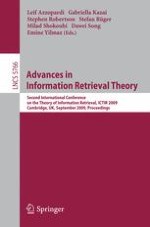This book constitutes the refereed proceedings of the Second International Conference on the Theory of Information Retrieval, ICTIR 2009, held in Cambridge, UK, in September 2009. The 18 revised full papers, 14 short papers, and 11 posters presented together with one invited talk were carefully reviewed and selected from 82 submissions. The papers are categorized into four main themes: novel IR models, evaluation, efficiency, and new perspectives in IR. Twenty-one papers fall into the general theme of novel IR models, ranging from various retrieval models, query and term selection models, Web IR models, developments in novelty and diversity, to the modeling of user aspects. There are four papers on new evaluation methodologies, e.g., modeling score distributions, evaluation over sessions, and an axiomatic framework for XML retrieval evaluation. Three papers focus on the issue of efficiency and offer solutions to improve the tractability of PageRank, data cleansing practices for training classifiers, and approximate search for distributed IR. Finally, four papers look into new perspectives of IR and shed light on some new emerging areas of interest, such as the application and adoption of quantum theory in IR.
